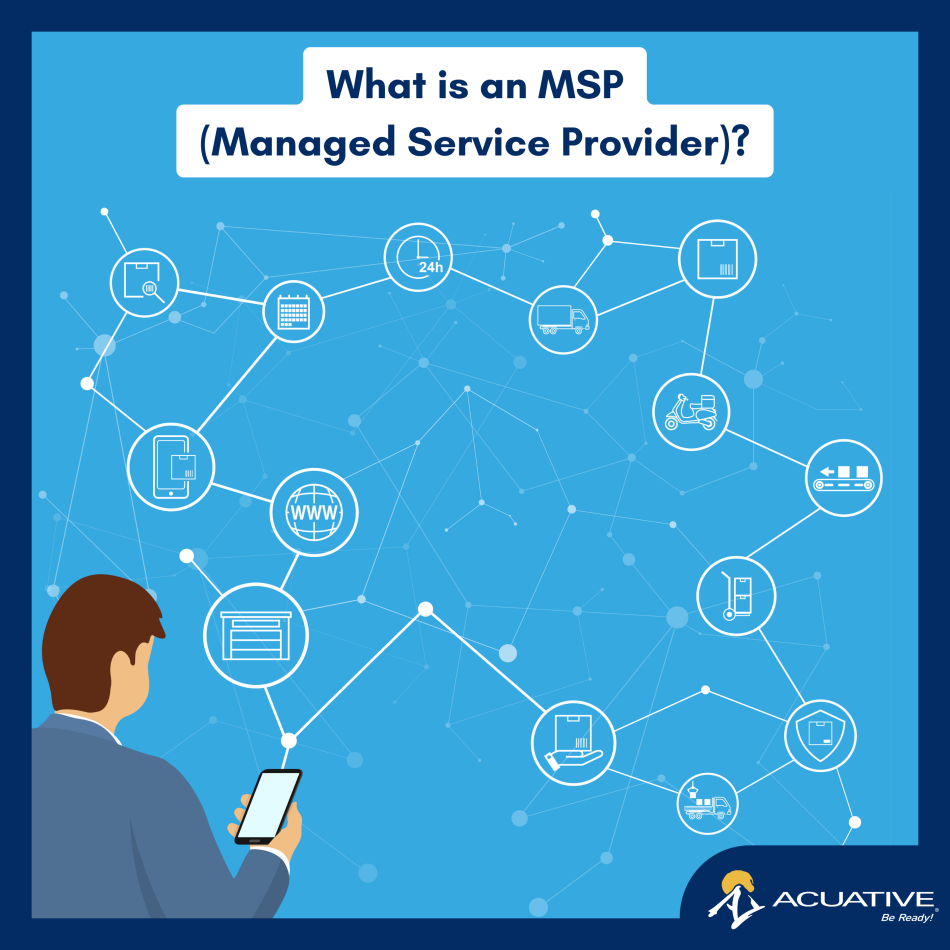With businesses facing the constant challenge of managing complex infrastructures, MSPs can act as invaluable partners, offering a diverse array of services tailored to meet the unique needs of modern enterprises, but what are MSPs?
MSPs, or Managed Service Providers, can be defined as organizations that deliver a range of IT services, typically on a subscription-based model, to help businesses effectively manage their technology infrastructure, streamline operations, and achieve cost savings.
Among these services, Managed Network Services focus specifically on managing and maintaining businesses' network infrastructure, ensuring optimal performance, security, and reliability.
Contents:
- What is an MSP in IT?
- Diving into MSP Services
- MSP Business Models
- Pros and Cons: MSPs vs In-House
- Managed Network Services with Acuative
What is an MSP in IT?
At the heart of MSP offerings lie Managed Network Services, dedicated to managing and maintaining businesses' network infrastructure. Unlike broader MSPs that offer a spectrum of IT services, Managed Network Service Providers (MNSPs) specialize in optimizing the performance, security, and reliability of clients' network environments. This specialization allows MNSPs to deliver targeted solutions tailored to meet the intricate demands of businesses' networking needs.
While Managed Network Service Providers (MNSPs) specialize in network management, other MSPs may offer a broader range of IT services, including payroll, workforce management, recruitment, etc. MNSPs capitalize on their expertise and focus to deliver tailored solutions specifically designed to optimize clients' network infrastructure.
Diving into MSP Services
Managed Service Providers extend a comprehensive suite of services aimed at ensuring the seamless operation of clients' network infrastructure:
- Managed Infrastructure: MSPs deliver expert maintenance and optimization of your IT environment, ensuring peak performance and security while you concentrate on strategic initiatives.
- Remote Monitoring and Management: Proactive monitoring of network devices and systems allows for swift identification and resolution of potential issues, minimizing downtime and optimizing performance.
- Managed Security Services: Robust security measures are implemented to safeguard against cyber threats, ensuring data integrity and confidentiality.
- Onsite Technical Support (Field Services): MSPs provide onsite technical support for troubleshooting and resolving network issues that require physical intervention, ensuring prompt resolution and minimal disruption to operations.
- Consulting: MSPs offer consulting services to help businesses develop strategic network infrastructure plans, optimize existing networks, and address specific challenges or requirements.
- Procurement: MSPs assist businesses in procuring hardware, software, and other network equipment, ensuring compatibility, reliability, and cost-effectiveness.
- Full Stack Observability: MSPs can offer full stack observability solutions, providing comprehensive insights into network performance, traffic patterns, and potential bottlenecks across all layers of the network stack.
- Unified Communications: MSPs provide integrated communication solutions, including voice, video, messaging, and collaboration tools, to enhance productivity and streamline communication across the organization.
MSP Business Models
Managed Service Providers (MSPs) typically operate on subscription-based business models, offering businesses access to a comprehensive suite of IT services for a fixed monthly fee. This approach not only ensures predictable costs but also delivers scalability and flexibility, allowing businesses to adapt to changing needs without the burden of hefty upfront investments. By leveraging MSPs, organizations can achieve significant cost savings compared to maintaining in-house IT infrastructure and personnel.
Pros and Cons: MSPs vs In-House
When businesses contemplate managing their network infrastructure, they face a crucial decision: hiring an MSP or maintaining an in-house network team. MSPs offer enticing benefits such as cost savings through subscription-based models, specialized expertise, and scalability to meet evolving needs. However, reliance on external providers can lead to communication challenges and alignment issues. In contrast, in-house teams provide greater control and customization in exchange for higher costs, potential limitations in expertise, and challenges in scaling operations.
Businesses must carefully weigh these factors against their budget, resource availability, and strategic objectives. Thus, the choice between an MSP vs. an in-house team hinges on individual business needs and priorities.
Managed Network Services with Acuative
At Acuative, we understand the pivotal role of network infrastructure in driving business success. We are committed to building long term relationships with our clients, adopting a Customer First mindset to maximize the satisfaction and success of our customers. Our Managed Network Services offer a holistic approach encompassing remote monitoring and management, managed security services, technical support, and business continuity planning. With a team of seasoned professionals and a proactive approach, we ensure that our clients' network environments are primed for performance, security, and reliability. For more information on how Acuative can help with your long term business goals, contact us below.

